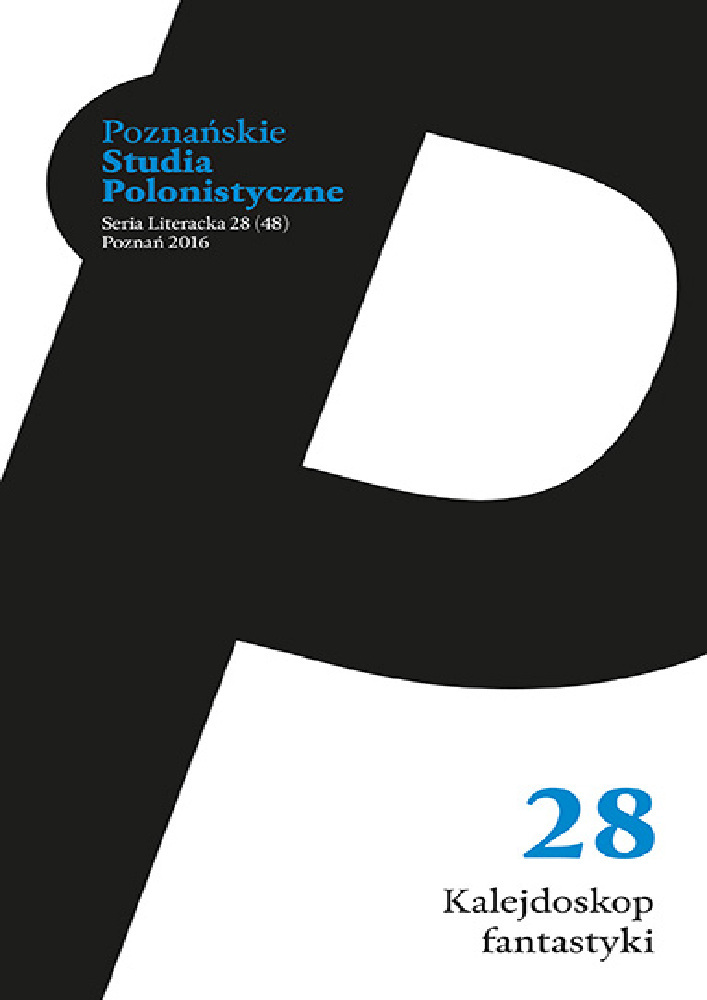Abstract
Time travel is one of the most popular themes in science fiction. Usually it is discussed from a perspective of technological and scientific possibilities for the realization of fantastic visions. Researchers focus on logical paradoxes implied by traveling back in time. The author of this article, inspired by David Wittenberg’s Time Travel: The Popular Philosophy of Narrative, draws attention to metanarrative functions of time travel theme, which becomes a challenge for writers and narrative techniques.References
Hammond Claudia (2013), Time Warped: Unlocking the Mysteries of Time Perception, Harper, New York.
Hamon Philippe (1983), Ograniczenia dyskursu realistycznego, przeł. Z. Jamrozik, „Pamiętnik Literacki”, z. 1, s. 221-262.
Handke Ryszard (1991), Ze Stanisławem Lemem na szlakach fantastyki naukowej, WSiP, Warszawa.
Heinlein Robert A. (1959), All You Zombies, „The Magazine of Fantasy and Science Fiction”, nr 3, s. 5-15.
Kermode Frank (2000), The Sense of an Ending: Studies in the Theory of Fiction with a New Epilogue, Oxford UP, Oxford.
Lem Stanisław (1974), The Time-Travel Story and Related Matters of SF Structuring, „Science Fiction Studies”, nr 3, s. 143-154.
Lem Stanisław (1984), Eden, Wydawnictwo Literackie, Kraków.
Leś Mariusz M. (2008), Fantastyka socjologiczna. Poetyka i myślenie utopijne, Wydawnictwo Uniwersytetu w Białymstoku, Białystok.
Levinson Paul (1995), The Chronology Protection Case, „Analog”, nr 9, s. 100-118.
Majewski Paweł (2007), Między zwierzęciem a maszyną. Utopia technologiczna Stanisława Lema, Wydawnictwo Uniwersytetu Wrocławskiego, Wrocław.
Nahin Paul J. (2011), Time Travel: A Writer’s Guide to the Real Science of Plausible Time Travel, Johns Hopkins UP, Baltimore.
Rowling Joanne K. (2001), Harry Potter i więzień Azkabanu, przeł. Andrzej Polkowski, Media Rodzina, Poznań.
Ryan Marie-Laure (2006), From Parallel Universes to Possible Worlds: Ontological Pluralism in Physics, Narratology, and Narrative, „Poetics Today”, nr 4, s. 633-674.
Ryan Marie-Laure (2013), Transmedial Storytelling and Transfictionality, „Poetics Today”, nr 3, s. 361-388.
Sawaszkiewicz Jacek (1978), „Chronos”, w: tegoż, Czekając, Wydawnictwo Poznańskie, Poznań, s. 54-66.
Smith Nicholas J. J. (2005), Why Would Time Travelers Try To Kill Their Younger Selves?, „The Monist”, nr 3, s. 388-395.
Smuszkiewicz Antoni (1990), Podróż w czasie [hasło], w: Andrzej Niewiadowski, Antoni Smuszkiewicz, Leksykon polskiej literatury fantastycznonaukowej, Wydawnictwo Poznańskie, Poznań, s. 324-326.
Strehle Susan (1992), Fiction in the Quantum Universe, The University of North Carolina Press, Chapel Hill–London.
Vinge Vernor (1993), The Coming Technological Singularity: How to Survive in the Post-Human Era, [dostęp: 3 kwietnia 2014], https://www-rohan.sdsu.edu/faculty/vinge/misc/singularity.html.
Wittenberg David (2013), Time Travel: The Popular Philosophy of Narrative, Fordham University Press, New York.
Yu Charles (2013), Top Ten Tips for Time Travelers, w: The Time Traveler’s Almanac, red. Ann i Jeff VanderMeer, Tor, New York.
Zimbardo Philip G., Boyd John (2008), Time Paradox, Simon and Schuster, New York.
License
Authors
Authors of texts accepted for publication in „Poznańskie Studia Polonistyczne. Seria Literacka” are required to complete, sign and return to the editor's office the Agreement for granting a royalty-free license to works with a commitment to grant a CC sub-license.
Under the agreement, the authors of texts published in „Poznańskie Studia Polonistyczne. Seria Literacka” grant the Adam Mickiewicz University in Poznań a non-exclusive, royalty-free license and authorize the use of Attribution-NoDerivatives 4.0 International (CC BY-ND 4.0)Creative Commons sub-license.
The authors retain the right to continue the free disposal of the work.
Users
Interested Internet users are entitled to use works published in „Poznańskie Studia Polonistyczne. Seria Literacka” since 2016, for non-commercial purposes only, under the following conditions:
- attribution - obligation to provide, together with the distributed work, information about the authorship, title, source (link to the original work, DOI) and the license itself.
- no derivatives - the work must be preserved in its original form, without the author's consent it is not possible to distribute the modified work, such as translations, publications, etc.
Copyrights are reserved for all texts published before 2016.
Miscellaneous
Adam Mickiewicz University in Poznań retains the right to magazines as a whole (layout, graphic form, title, cover design, logo etc.).
